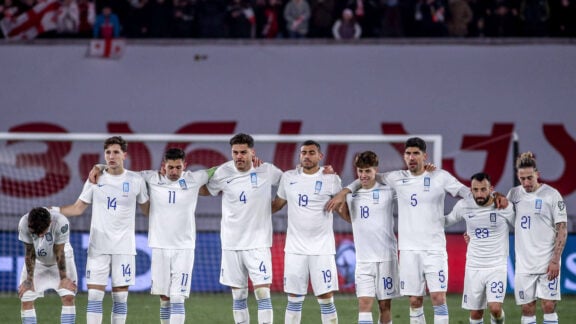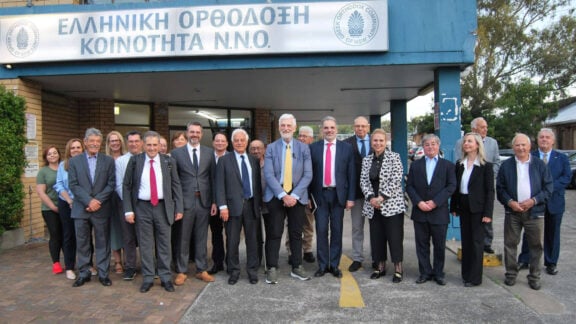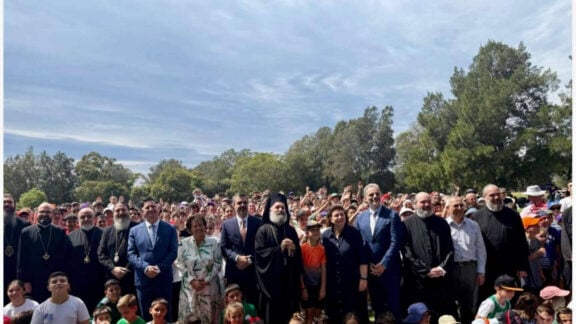Every Sunday, something quietly beautiful unfolds in Melbourne’s northern suburb of Coburg North.
Inside the restored two-storey building known as “The Kastoria Club”, elderly members of the Greek community gather not for ceremony or spectacle, but for something more fundamental: connection. Hosted by the Kastorian Association of Australia “Kastoria”, the weekly gathering offers open doors, warm meals, and the simple gift of presence.
“It’s not complicated,” says association president Effie Lalopoulos. “We welcome anyone who needs company. No need to be a member—just walk in, have a coffee, enjoy our homemade village-style food, and stay for a chat. And if someone doesn’t want to eat, we send them off with a sweet and a smile.”
What began as Lalopoulos’ dream years ago—transforming a dark, unused hall into a hub of laughter and human warmth—has become a beacon of love and care for elderly Greek Australians, many of whom silently battle the creeping weight of isolation.

From silence to laughter
For Lalopoulos, the moments that matter most are not the numbers, but the smiles. “I’ve seen people who hardly spoke at first, and now they’re laughing nonstop,” she says.
One elderly man, 95 years old, arrives faithfully every Sunday, brought by his daughter. “He waits eagerly at the door, spends the whole day with us—eating, playing cards, having his coffee—and goes home in the evening. It’s his day.”
From 11am until as late as 9pm, the hall becomes a vibrant intergenerational space. New friendships form over coffee and cards, men gather around tavli boards, women sit in groups chatting, laughing, and even helping with gardening when needed. “One day I saw them outside working in the heat,” Lalopoulos recalls. “I said, ‘Why are you doing this?’ and one 90-year-old said, ‘It brings us joy, my girl. Let us.’ What do you say to that?”

Learning Thursdays: Technology, notes, and laughter
On Thursdays, the hall transforms again—into a school of modern life. Elders gather around tables, not with textbooks, but with smartphones, notes, and curiosity. With coffee and sweets on hand, they learn how to use digital tools, GPS, and messaging apps from a volunteer instructor.
“It’s so empowering,” says Lalopoulos. “Recently, our teacher showed us how to use GPS—and the other night when I got lost, I turned it on and it brought me home!”
Here, technology becomes less intimidating and more of a friend, while the real gift is in the shared learning and social interaction—keeping minds alert and hearts open.

The psychology behind it: ‘Connection is medicine’
Greek-Australian psychologist Dr Eleni Kalampouka, a regular presence at the manor, explains the deeper significance. “Since COVID, many elderly people suffer from anxiety and depression. They may receive practical care, but what they truly miss is someone to talk to.”
Loneliness, she says, is not just an emotional state—it’s a medical risk. It accelerates memory decline, increases the chances of dementia, and can even shorten life expectancy.
“Japan, where many elderly live alone, has some of the world’s highest dementia rates. In contrast, Mexico, where community and family bonds remain strong, has some of the lowest,” Dr Kalampouka explains. “Australia sits somewhere in the middle. Culture and lifestyle make all the difference.”

A model of community care
Dr Kalampouka praises the Kastorian Association and its president for creating a living, breathing solution to a systemic gap.
“In Australia, day programs for seniors are limited and often full. We have waiting lists where someone has to pass away for a spot to open. Community organisations like this can fill that gap using spaces they already have. It only takes one or two days a week to make a difference.”
She urges other cultural associations to follow suit—using grants, volunteers, and vision to turn empty halls into vibrant meeting points.

More than a hall—A belonging
At Kastoria, the goal isn’t grand strategy. It’s presence. It’s offering people somewhere to go, something to look forward to, and someone waiting to greet them.
“This isn’t just about food or coffee,” says Dr Kalampouka. “It’s about being seen, being useful, being part of something. That’s the real medicine.”
Indeed, the Kastorian Association is doing more than serving meals—it’s serving purpose, continuity, and love. And the impact is so tangible, the lane next to the building will soon be named Kastoria Lane, a symbolic recognition of what has been built here: not just a community program, but a model of dignity and care for our elders.










